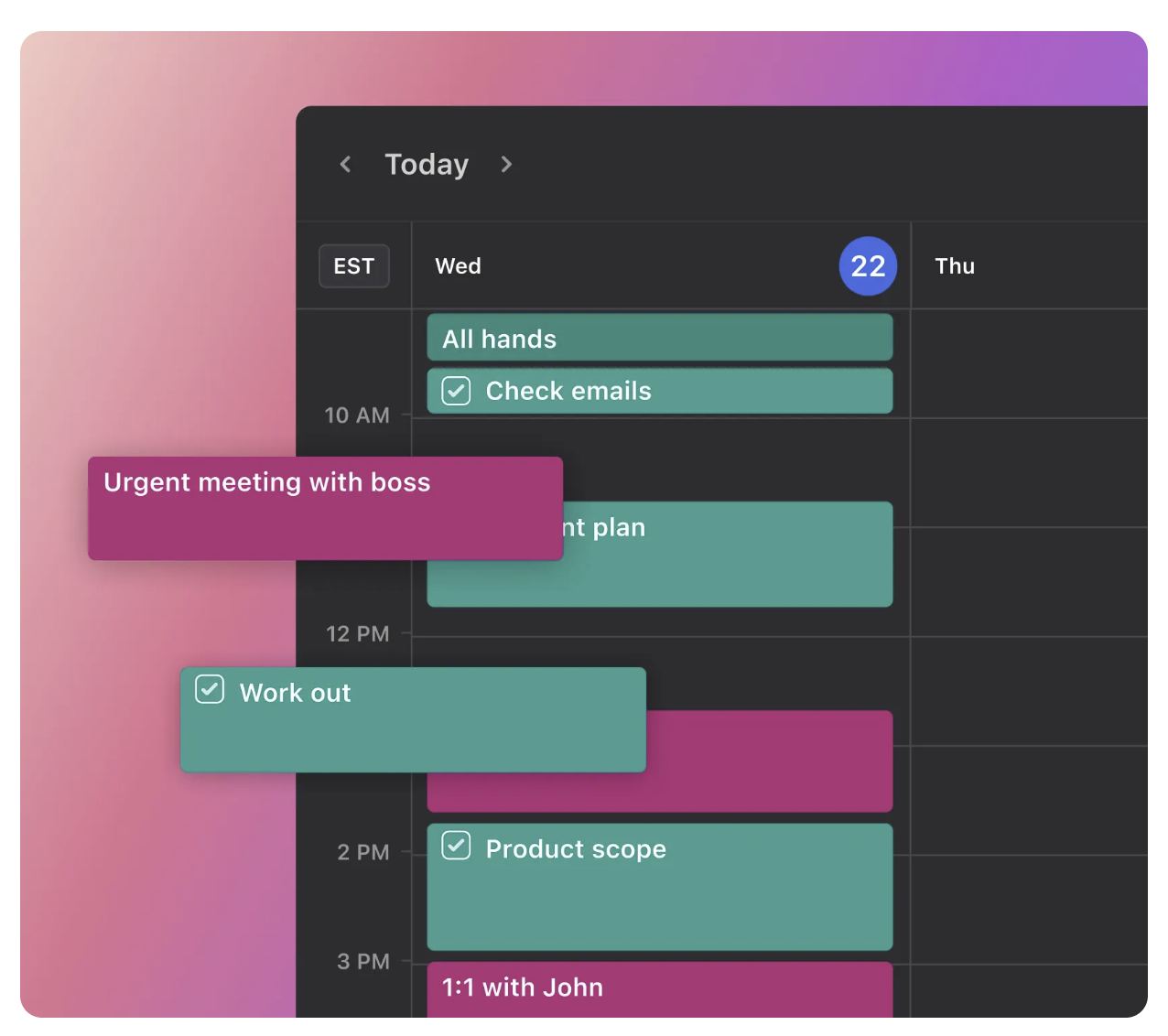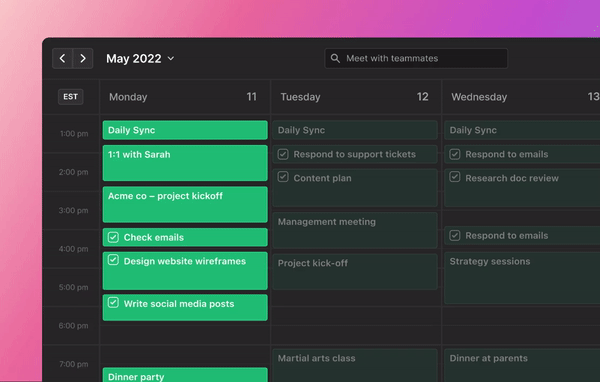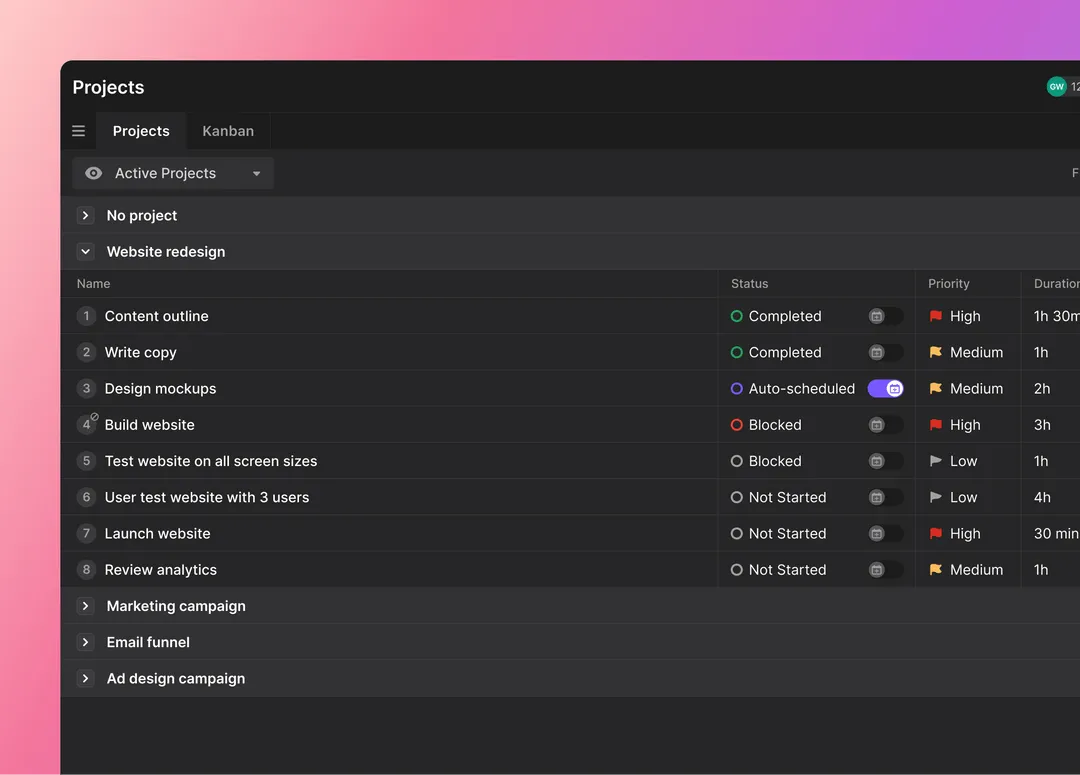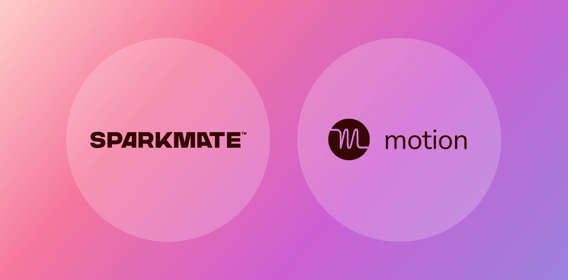Find out how tech startup Sparkmate uses Motion to automate tedious — yet vital — weekly planning, delegate work, and ship projects faster.
“I’m always testing new products. My Co-founder Max says, ‘No, not useful’ to most of the products I test. He’s picky, for very good reasons. And then he tried Motion. After a week, he was like, ‘Okay, that’s amazing.’’
- Morgan Pelissier, Co-Founder of Sparkmate
About Sparkmate
Founded in 2020, Sparkmate helps entrepreneurs develop tech products, from idea to market launch, in less than 30 weeks.
The challenge: Automating Morgan’s go-to productivity strategy and delegating work to teammates
Morgan Pelissier, co-founder of Sparkmate, automates whatever he can. “I have a rule in my company. Everything you do twice, you automate.”
Automation, he believes, gives small teams the efficiency of large teams. It saves time, a resource extremely valuable to every business, but especially to startups.
And so, his company automates any task they repeatedly do.
But Morgan still had a few work tasks that were painfully time consuming and manual — task prioritization, task delegation with teammates, time management, and time blocking.
Related: What is time blocking and why should you do it?
As a life-time entrepreneur, Morgan’s learned over time that detailed weekly planning, correct task prioritization, team collaboration, time management, and time blocking maximize his productivity, keep him focused, and save time.
Morgan wanted a way to streamline task collaboration and task management with his co-founder and Xyra, his right arm. And he was looking for a way to automate time blocking and task prioritization.

As a life-time entrepreneur, Morgan’s learned over time that time blocking maximizes his productivity, keeps him focused, and saves time.
Time blocking increases productivity for a few reasons:
- It reserves time for challenging, time-consuming work, ensuring that your schedule isn’t filled with only meetings or busy work — like responding to emails.
- It provides a step-by-step schedule for the day that shows the next most important task to work on. When Morgan doesn’t time block, he’s often unsure what he should work on next, “As I jump between meetings and work, it's hard to keep track of what I need to do, next steps, and urgency,” says Morgan.
- It reduces distractions. Since time blocking provides a schedule for each moment of the workday, it decreases the likelihood that workers will get off task with unimportant work or distractions.
While Morgan loves time blocking, he didn’t want to manually add tasks to his calendar every day. He wanted to automate the process.
So he rigged his own system to automatically time block tasks onto his calendar by coding a script that turned emails into tasks and added them to his calendar.
This worked — until Morgan needed to collaborate with his team on projects and delegate work to other teammates. His self-created script only allowed for his personal tasks and personal calendar. He couldn’t share those tasks with coworkers and delegate them.
That’s when Morgan decided to try Motion.
“When my two co-founders came to take some stuff off my plate, so I could focus more on the growth of the company, I realized I needed a way to push my tasks to someone. And Motion is great for that.”
Using Motion for weekly planning, automating organization, and team task collaboration
Motion quickly became a key part of Morgan’s workday. “It was pretty flexible,” says Morgan. “I didn’t need to change my workflow much to use Motion.”
But Morgan worried how his co-founder Max would feel about Motion. “I’m always testing new products. My Co-founder Max says, ‘No,’ to most of those products. He’s picky, for very good reasons,” says Morgan.
To migrate to a new tool, Sparkmate often spends weeks or months setting it up. This time and resource investment is costly. That’s why Max is cautious when trying new products. There must be a return on investment to the business when adopting a new product.
“And then Max tried Motion,” says Morgan. “After a week, he was like, ‘Okay, that’s amazing.’’’
Morgan laughs and says, “And then Max tried Motion. After a week, he was like, ‘Okay, Motion’s amazing.’’’
Here’s why Morgan and the Sparkmate team chose Motion:
Motion auto-schedules tasks onto each teammate’s calendar.
When asked what the biggest benefit of Motion is for Sparkmate, Morgan says, “Auto scheduling. It’s a killer feature. I don’t have to think, ‘What should I do next?’”
He explains, “You let yourself go. You put urgency, time, and task details into Motion, and then it shows you the tasks you need to do in the correct order. It helps me be on autopilot.”

Motion rebuilds your schedule when priorities change.
Before Motion, Morgan and his team had to reorganize their schedules when tasks or meetings moved. “The cool thing with motion is, if a schedule changes, Motion changes my schedule,” says Morgan.

Motion helps Sparkmate easily collaborate on projects and tasks.
Motion solved Morgan’s delegation challenge and helps him delegate tasks to his team. “On Sunday nights, I open my tasks in Motion, and I’ll check if I need to do a task or if I can give it to someone else,” says Morgan.
“And then, I just click a button to send tasks to my teammates.”

Motion combines three powerful tools into one.
Instead of a separate meeting scheduler, project management, and calendar tool, Motion combines all of these tools into one unified platform.
“The fact that it's bundled inside the calendar is very good. You have one place where you can get everything and that’s it,” says Morgan.
With Motion, Morgan and Sparkmate ship work faster, work together better, and spend less time manually prioritizing work.
With the help of Motion, Sparkmate began completing work faster and working together better. “We tend to ship things faster,” says Morgan. “I'm able to delegate more easily than before. So things do not rely a hundred percent on me.”
It’s also decreased the time Morgan spends prioritizing tasks and figuring out what to work on next. “I let myself go a bit more on task management,” says Morgan “There’s a bit less mental load, less thinking, ‘What do I need to ship? What do I need to remember?’ Because it’s inside Motion.”
Motion made the Sparkmate team more efficient and focused. “Motion allowed me to automate organization,” says Morgan.





